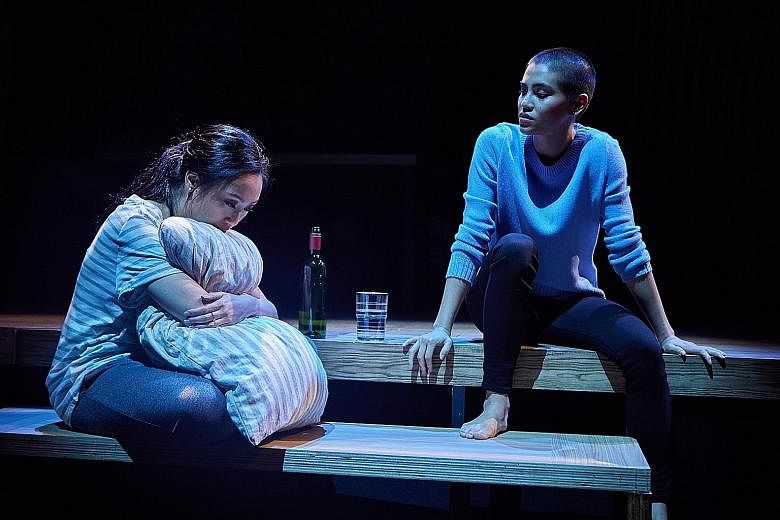REVIEW / THEATRE
THIS IS WHAT HAPPENS TO PRETTY GIRLS
Pangdemonium Theatre
Drama Centre Theatre/Sunday
Much of This Is What Happens To Pretty Girls starts with provocation.
There is the use of Blurred Lines, Robin Thicke's controversial 2013 hit with its refrain of "I know you want it". There is Eucien Chia's set, over which loom structures contoured to resemble nude body parts: breasts, buttocks, pelvis.
There is the opening scene, in which actor Adrian Pang, topless and glistening with sweat, does chin-ups in the gap between the legs of said giant pelvis.
Provocation is central to the issues that the play, directed by Tracie Pang, wants to tackle: consent, sexual misconduct, victim-blaming and toxic masculinity. It is raw, powerful stuff - one that will leave audiences shaken.
For all its resonance with the #MeToo movement and with recent matters such as the National University of Singapore's voyeurism scandal, it is concerned less with blunt finger-pointing and more with blurred lines.
Pang plays Lester, the foul-mouthed, machismo-oozing chief executive of a bike-sharing company notorious for its "bro culture".
This does not sit well with new hire Natasha (Tess Pang, in a magnetic debut on the Singapore stage), who bristles at her colleagues' sexism.
Elsewhere, literature professor Amanda (Oon Shu An) finds herself drawn to Sean (Thomas Pang), a bright, persistent student who wants to drop law and switch to her course instead.
Becky (Serene Chen, in a remarkably layered turn) is a well-regarded feminist academic whose ideals are tested when somebody she loves is accused of sexual assault.
-
BOOK IT / THIS IS WHAT HAPPENS TO PRETTY GIRLS
-
WHERE: Drama Centre Theatre, Level 3 National Library Building, 100 Victoria Street
WHEN: Till May 26, Tuesdays to Fridays, 8pm; Saturdays, 3 and 8pm; Sundays, 3pm (with 8pm show on May 26)
ADMISSION: $40 to $75 from Sistic (call 6348-5555 or go to www.sistic.com.sg)
INFO: Rated NC16 for sexual scenes and coarse language. For more information, go to pangdemonium.com
Playwright Ken Kwek spoke to some 100 people for research, ranging from those who have experienced sexual harassment and assault to those who think #MeToo has gone too far.
Some characters do come across as mouthpieces for various opinions and one storyline closely mirrors the Aziz Ansari controversy, in which the American comedian was accused online of pressuring a woman into sex on a date but maintained he had believed what they did to be completely consensual.
There are also melodramatic flourishes - broken glass, drunken screaming and one very unconvincingly thrown punch - that do not always deliver emotionally.
But enough of the characters are well-realised and relatable - both victims and perpetrators alike.
This is the most ambitious part of Pangdemonium's project: the paradigm shift needed to demonstrate that the people who commit or enable sexual harassment and assault are not always exceptional or monstrous.
They could be people whom you would deem in passing to be decent and normal. They could be your boyfriend, husband or son. They could even be you - if some act that society had led you to believe was acceptable turned out to have irreparably hurt somebody else.
This, too, the play tries to grapple with: What should happen in the aftermath of such harm? How should apologies be delivered, retribution pursued?
Says one character who has been assaulted: "Not once has anybody asked me how I am."
This Is What Happens To Pretty Girls is a long, sobering look at the ways in which today's culture continues to fail victims and create aggressors. It should provoke audiences to ask themselves some hard questions of their own.


